what is the attitude of china facing of the Syria war
- 格式:docx
- 大小:15.20 KB
- 文档页数:1
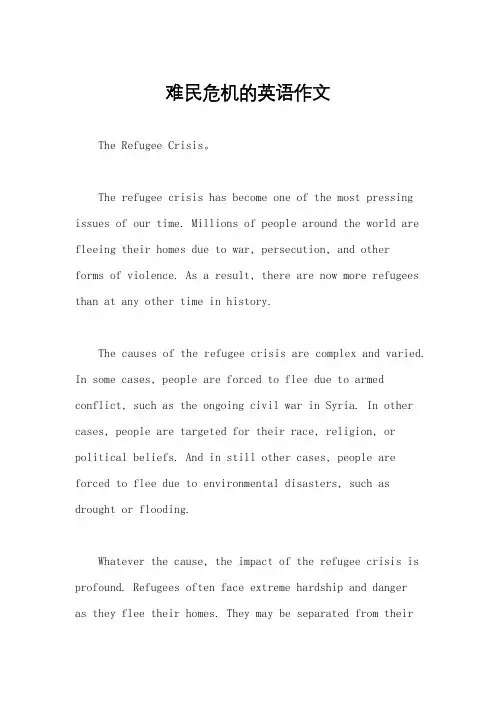
难民危机的英语作文The Refugee Crisis。
The refugee crisis has become one of the most pressing issues of our time. Millions of people around the world are fleeing their homes due to war, persecution, and otherforms of violence. As a result, there are now more refugees than at any other time in history.The causes of the refugee crisis are complex and varied. In some cases, people are forced to flee due to armed conflict, such as the ongoing civil war in Syria. In other cases, people are targeted for their race, religion, or political beliefs. And in still other cases, people are forced to flee due to environmental disasters, such as drought or flooding.Whatever the cause, the impact of the refugee crisis is profound. Refugees often face extreme hardship and dangeras they flee their homes. They may be separated from theirfamilies, forced to live in overcrowded and unsanitary conditions, and subjected to violence and abuse.In addition to the immediate dangers faced by refugees, there are also long-term consequences to consider. Refugees often struggle to rebuild their lives in a new country, facing language barriers, discrimination, and a lack of resources.Despite the challenges, there are many organizationsand individuals working to address the refugee crisis. Governments around the world are providing funding and support to help refugees, while non-governmental organizations are providing food, shelter, and medical care. Individuals are also getting involved, volunteering their time and resources to help refugees in need.Ultimately, the refugee crisis is a global issue that requires a global response. We must work together toaddress the root causes of the crisis, provide support to refugees in need, and create a more peaceful and just world for all.。
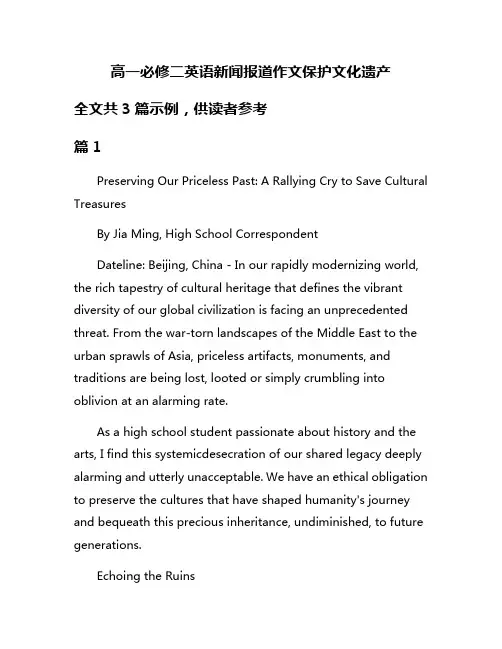
高一必修二英语新闻报道作文保护文化遗产全文共3篇示例,供读者参考篇1Preserving Our Priceless Past: A Rallying Cry to Save Cultural TreasuresBy Jia Ming, High School CorrespondentDateline: Beijing, China - In our rapidly modernizing world, the rich tapestry of cultural heritage that defines the vibrant diversity of our global civilization is facing an unprecedented threat. From the war-torn landscapes of the Middle East to the urban sprawls of Asia, priceless artifacts, monuments, and traditions are being lost, looted or simply crumbling into oblivion at an alarming rate.As a high school student passionate about history and the arts, I find this systemicdesecration of our shared legacy deeply alarming and utterly unacceptable. We have an ethical obligation to preserve the cultures that have shaped humanity's journey and bequeath this precious inheritance, undiminished, to future generations.Echoing the RuinsMy profound connection to this issue was forged during a family trip to the ancient city of Palmyra in Syria several years ago. As I walked amidst the majestic ruins of monuments that predated Christianity, I was overwhelmed by the profound significance imbued within these stone testaments to human ingenuity. Suddenly, the theoretical construct of "cultural heritage" became a visceral reality.Sadly, many of the archaeological wonders I experienced no longer exist, having fallen victim to the depravations of the Islamic State in their iconoclastic rampage. The Temple of Bel, an icon of Palmyra's golden age which I vividly recall, now lies in ruins - another irreplaceable loss for the world.Such cultural atrocities have been perpetrated throughout human history, but their modern prevalence has reached unparalleled proportions in the era of globalization. In the blink of an eye, wondrous legacies birthed across millennia can be obliterated through warfare, ideological extremism, looting, urban development, environmental perils, and simple negligence.Ravages of War and ExtremismBeyond Palmyra's devastation, the recent conflicts ravaging Syria, Iraq, Yemen, and Mali have exacted a chilling toll on globalheritage sites. In Afghanistan, the Taliban's 2001 demolition of the ancient Bamiyan Buddhas remains a haunting nadir of cultural vandalism. From the destruction of Aleppo's ancient markets and mosques, to the looting of the Iraq Museum, our shared history is being erased at the hands of extremists.The Plunder for ProfitHowever, willful destruction is not the only threat faced by our treasures. The illicit antiquities trade has emerged as a lucrative criminal enterprise, incentivizing the looting of archaeological sites and museum collections worldwide. This cultural racketeering has become a prime revenue source for terrorist and organized crime syndicates.In India, the brazen theft of priceless artifacts from houses of worship and historical shrines has sparked outrage and impassioned preservation efforts. On the Italian peninsula, archaeological looters employing destructive excavation tactics have devastated Etruscan and Roman ruins in a modern plundering no less deplorable than the sackings of old.Development's TollAs developing nations undergo rapid urbanization and modernization, the loss of cultural heritage frequently takes abackseat to economic priorities. The idyllic UNESCO World Heritage town of Lijiang in China is essentially being torn asunder to accommodate mass tourism and commercial development. Countless historical neighborhoods and vernacular dwellings are disappearing beneath the bulldozers of "progress."Even in the affluent West, age-old traditions are slipping into obscurity as their cultural significance is depreciated by the relentless advance of globalization. From Aboriginal Australian heritage sites being despoiled by mining conglomerates, to whole villages being razed for infrastructure mega-projects, our shared legacies are facing an onslaught of wanton desecration driven by greed and indifference.Nature's TollEnvironmental perils like rising sea levels, wildfires, earthquakes, and severe weather events exacerbated by climate change have also emerged as existential threats to heritage sites worldwide. The modern-day Wonders of the World like the ancient city of Venice in Italy and Cambodia's resplendent Angkor Wat temple complex face potential obliteration from flooding and ecological damage.Imperiled human landmarks as diverse as the Statue of Liberty, Stonehenge, the Galapagos Islands, and Tanzania's Serengeti Plains all hang in a precarious balance, at the mercy of these escalating natural cataclysms. As climate change accelerates, addressing its deleterious impacts on cultural heritage must become a priority for preservationists.A Unifying CauseWhile individual nations and organizations like UNESCO have commendable preservation initiatives, the enormity of this crisis demands a unified, global movement fueled by public engagement and youth advocacy. We students worldwide must rally as a collective voice to compel governments, corporations, and institutions to proactively safeguard our global cultural legacies before it is too late.Creative public outreach campaigns utilizing social media and digital technologies can inspire a new generation to value cultural heritage as a unifying force in our polarized,conflict-riven world. Personal visits and virtual tours of heritage sites via immersive technologies must become an integral part of education curricula to nurture true appreciation for our triumphs of human civilization.Additionally, preservationists must leverage the power of big data, artificial intelligence, digital replicas, and innovative cyber-archiving techniques to create robust digitized records of these wonders. This would at least ensure their informational essences survive, even if the physical embodiments are ultimately lost to the onslaught of time and indifference.Our Cultural LifelineCultural heritage is the irreplaceable heartbeat of our collective identity as a species – a unifying beacon that transcends modern borders, conflicts, and ideological divides. Its graceful monuments represent the apex of human creativity and perseverance, while intangible traditions encapsulate the essence of how civilizations flourished and ultimately faded.Our generation must not let the wondrous fruits of human culture wither away, for we will have severed our vital spiritual and historical tethers. We owe it to the scores of generations, past and future, to honor humanity's cultural legacies by being proactive custodians and passionate advocates for their preservation and reverence.What may seem like ancient ruins or outmoded folkways are in fact profoundly relevant touchstones for making sense of our world - the intergenerational wisdom of the ancients illuminatinguniversal truths about our existence. They are enduring monuments to humanity's boundless achievements, profound struggles, recurring follies, and eternal hopes for a better world.As a student coming of age in this era of unprecedented technological prowess yet escalating upheaval, I call upon my peers everywhere to champion this noble cause. Together, we must give voice to the voiceless cultures facing extinction and rally our communities to defend these irreplaceable treasures from thoughtless destruction.For unless we stem this manmade calamity actively unfolding across the globe, we imperil much more than ancient edifices or archaic customs. We threaten the very spiritual and cultural lifelines connecting our societies, thereby severing our species' collective soul. And a world drained of its cultural heritage and diversity would surely be a cold, hollow place devoid of richness and meaning.So let this clarion call be sounded - we must summon our formidable creative and scientific resources to proactively safeguard humanity's priceless legacy. Our generation's actions today will indelibly influence the cultural inheritance we bequeath to posterity and echo across the ages.篇2Preserving Our Priceless Cultural LegacyAs a high school student, I've always been fascinated by history and the incredible cultural treasures left behind by ancient civilizations. From the awe-inspiring pyramids of Giza to the intricate carvings of Angkor Wat, these monuments stand as a testament to the ingenuity and creativity of our ancestors. However, it's deeply concerning to witness the rate at which these invaluable heritage sites are being threatened by various factors, including natural disasters, urbanization, and even human negligence.In recent years, the world has witnessed numerous heartbreaking instances of cultural heritage sites being destroyed or damaged beyond repair. The tragic loss of the ancient city of Palmyra in Syria, which fell victim to the barbaric actions of extremist groups, serves as a poignant reminder of the fragility of our shared cultural legacy. The deliberate demolition of these priceless artifacts, dating back thousands of years, represents an attack not only on the Syrian people but on the collective human experience.Closer to home, the devastating bushfires that ravaged parts of Australia in 2019-2020 had a profound impact on indigenous heritage sites. Ancient rock art, some estimated to be over 30,000 years old, was irreversibly damaged or lost forever. These rock art galleries are not merely aesthetic wonders but also serve as invaluable records of the rich cultural traditions and histories of Aboriginal communities.The issue of preserving cultural heritage extends far beyond the realms of ancient monuments and archaeological sites. Traditional crafts, languages, and indigenous knowledge systems are also at risk of being lost to the inexorable march of modernization and globalization. As younger generations increasingly embrace contemporary lifestyles, the intangible aspects of cultural heritage, such as oral histories, traditional music, and dance forms, face an existential threat.Preserving our cultural heritage is not merely a matter of preserving physical structures or artifacts; it is about safeguarding the very essence of our shared human experience. These sites and traditions serve as a powerful reminder of our collective journey, the triumphs and struggles that have shaped our societies, and the enduring spirit of creativity and innovation that transcends generations.Governments, international organizations, and local communities must work in tandem to develop comprehensive strategies for the protection and preservation of cultural heritage sites. This effort necessitates not only financial resources but also a deep commitment to education and awareness-raising initiatives. By fostering a greater appreciation for the significance of these sites and traditions, we can cultivate a sense of shared responsibility among global citizens.Educational programs that highlight the historical, cultural, and scientific value of heritage sites can play a crucial role in engaging younger generations. Interactive exhibitions, virtual tours, and immersive experiences can help bridge the gap between the past and present, fostering a deeper connection with our collective heritage.Furthermore, the integration of cultural heritage preservation into sustainable development goals is essential. By recognizing the intrinsic link between cultural preservation and economic development, we can create opportunities for local communities to benefit from the responsible management and promotion of these sites. This approach not only ensures the long-term sustainability of preservation efforts but alsoempowers communities to become active stakeholders in the process.International cooperation and knowledge-sharing are also vital components of effective cultural heritage preservation. By facilitating the exchange of best practices, expertise, and resources among nations, we can collectively tackle the challenges posed by natural disasters, conflicts, and environmental degradation.As global citizens, it is our collective responsibility to safeguard the world's cultural heritage for future generations. These sites and traditions are not mere relics of the past but living embodiments of our shared human experience, offering invaluable insights into the richness and diversity of our collective journey.In conclusion, the preservation of cultural heritage is a cause that transcends borders and generations. It is a testament to our shared values, our commitment to preserving the tapestry of human ingenuity, and our recognition of the profound impact that these sites and traditions have on our understanding of ourselves and our place in the world. By embracing this responsibility wholeheartedly, we can ensure that our pricelesscultural legacy endures, inspiring and enlightening generations to come.篇3Preserving Our Priceless Past: A Call to Protect Cultural HeritageBy Xiao Ming, High School Student ReporterIn our rapidly modernizing world, the loss of cultural heritage has become an increasingly pressing issue. From ancient architectural marvels crumbling into ruin to traditional arts and crafts fading into obscurity, the erosion of our rich cultural legacy is a tragedy unfolding before our eyes. As the inheritors of this invaluable patrimony, we bear a solemn responsibility to safeguard these priceless treasures for generations to come.At the heart of this crisis lies a fundamental disconnect between progress and preservation. The relentless march of development, fueled by urbanization and industrialization, has often come at the expense of our cultural roots. Historic sites have been razed to make way for modern construction, while age-old traditions and practices have been cast aside in pursuit of economic prosperity.One need not look far to find poignant examples of this cultural erosion. The ancient Silk Road cities of Central Asia, once thriving epicenters of trade and cultural exchange, now stand as mere shadows of their former glory. The magnificent Buddhist stupas of Bamiyan in Afghanistan, towering testaments to human ingenuity that withstood the ravages of time for centuries, were brutally destroyed by the Taliban in 2001, a loss that left the world reeling.Closer to home, the rapid modernization of China has posed significant challenges to the preservation of our nation's rich cultural tapestry. Traditional villages, replete with unique architectural styles and time-honored customs, have been engulfed by the tide of urbanization. Intangible heritage, such as ancient folk songs, dances, and storytelling traditions, risk being forgotten as younger generations increasingly embrace contemporary lifestyles.The consequences of this cultural amnesia extend far beyond mere sentimentality. Our heritage is not merely a relic of the past but a living, breathing embodiment of our collective identity. It is a wellspring of wisdom and inspiration, a testament to the triumphs and struggles of our ancestors that imbues our lives with depth and meaning.By severing our connection to this heritage, we risk becoming rootless wanderers, adrift in a sea of homogeneity and lacking the cultural anchors that ground us in a sense of place and purpose. Moreover, the loss of cultural diversity impoverishes the world, depriving humanity of the rich tapestry of stories, traditions, and perspectives that have shaped our shared journey.Fortunately, there are glimmers of hope amidst this encroaching crisis. Governments, organizations, and individuals around the globe have taken up the mantle of cultural preservation, working tirelessly to protect and revitalize our endangered heritage.International bodies like UNESCO have played a pivotal role in raising awareness and coordinating efforts to safeguard cultural sites and practices of outstanding universal value. Through initiatives like the World Heritage List and the Intangible Cultural Heritage program, they have helped to galvanize global support and funding for preservation efforts.At the national level, countries have implemented laws and policies to protect their cultural legacies. China, for instance, has established a comprehensive system of cultural heritage protection, encompassing everything from ancient monumentsand historic districts to intangible cultural heritage like traditional handicrafts and performing arts.However, the battle to preserve our cultural heritage cannot be waged solely by governments and international organizations. It is a collective endeavor that requires the active participation of communities and individuals.Grassroots movements have sprung up around the world, driven by a passionate commitment to preserving local traditions and ancestral knowledge. In remote villages, elders have taken it upon themselves to pass down their crafts and oral histories to younger generations, ensuring that these invaluable legacies are not lost to the sands of time.Innovative projects have also harnessed the power of technology to breathe new life into cultural preservation efforts. Digital archives and virtual reality recreations have allowed us to experience and appreciate heritage sites and traditions in unprecedented ways, making them accessible to a global audience and ensuring their survival even in the face of physical degradation.As a young person living in this pivotal era, I cannot overstate the importance of our role in this critical endeavor. We are the torchbearers of our cultural legacy, entrusted with thesacred duty of carrying it forward into the future. It is incumbent upon us to not only appreciate and understand our heritage but to actively participate in its preservation and promotion.We can start by immersing ourselves in the rich tapestry of our cultural traditions, seeking out opportunities to learn and experience them firsthand. Whether it's attending a traditional dance performance, visiting a historic site, or simply engaging with elders to learn about their stories and customs, these experiences will forge an indelible connection to our roots and ignite a passion for their preservation.Furthermore, we must embrace the mantle of cultural ambassadors, sharing our heritage with the world and fostering cross-cultural understanding and appreciation. In our increasingly interconnected global community, this exchange of cultural perspectives is vital to promoting harmony, respect, and mutual enrichment among all peoples.Perhaps most importantly, we must be unwavering advocates for the protection and revitalization of our cultural legacies. We can lend our voices to campaigns and initiatives aimed at raising awareness and garnering support for preservation efforts. We can volunteer our time and resources toassist in the restoration and maintenance of heritage sites and the documentation of intangible cultural practices.Ultimately, the preservation of our cultural heritage is not merely a nostalgic pursuit but a moral imperative. It is a sacred trust bestowed upon us by our ancestors, a responsibility to honor their sacrifices and triumphs by ensuring that their stories, their achievements, and their wisdom endure through the ages.As we stand at the crossroads of tradition and modernity, let us choose the path of cultural stewardship. Let us embrace our role as custodians of our priceless past, safeguarding it not as a relic frozen in time but as a living, breathing testament to the resilience and ingenuity of the human spirit.For in preserving our heritage, we preserve not only the echoes of our ancestors but the very essence of who we are as a people. It is a noble endeavor that transcends boundaries and generations, weaving together the tapestry of our shared human experience and enriching the world with the vibrant hues of our cultural diversity.So let us heed the call to action, my fellow torchbearers. Let us band together, transcending borders and backgrounds, united in our unwavering commitment to this sacred cause. For in doing so, we ensure that the priceless treasures of our past willilluminate the path toward a future where the richness of our cultural tapestry endures, inspiring and guiding generations yet to come.。

有关国际新闻的英文作文英文:As an avid follower of international news, I find it fascinating to stay updated on the latest events and developments around the world. The diversity of cultures, politics, and social issues makes international news both informative and thought-provoking. One recent international news story that caught my attention was the ongoing trade tensions between the United States and China.The trade war between the two economic powerhouses has been a hot topic in international news for quite some time now. It has not only impacted the global economy but has also caused ripple effects in various industries. For example, the technology sector has been particularly affected, with companies like Apple and Huawei facing challenges due to tariffs and restrictions on trade.中文:作为一个国际新闻的忠实追随者,我发现保持对世界各地最新事件和发展的关注是非常迷人的。
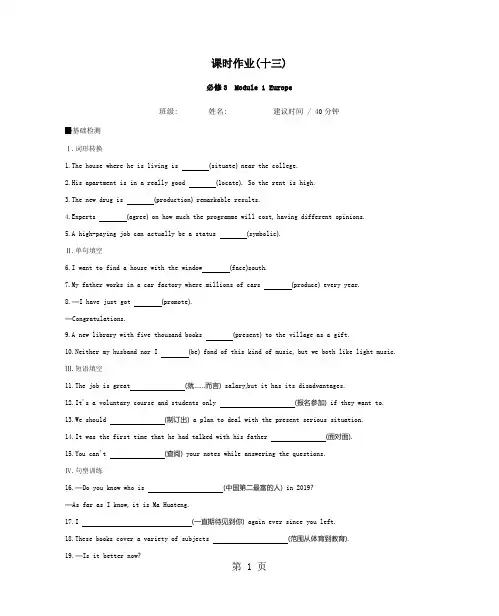
课时作业(十三)必修3Module 1 Europe班级:姓名:建议时间 / 40分钟基础检测Ⅰ.词形转换1.The house where he is living is (situate) near the college.2.His apartment is in a really good (locate). So the rent is high.3.The new drug is (production) remarkable results.4.Experts (agree) on how much the programme will cost, having different opinions.5.A high-paying job can actually be a status (symbolic).Ⅱ.单句填空6.I want to find a house with the window(face)south.7.My father works in a car factory where millions of cars (produce) every year.8.—I have just got (promote).—Congratulations.9.A new library with five thousand books (present) to the village as a gift.10.Neither my husband nor I (be) fond of this kind of music, but we both like light music. Ⅲ.短语填空11.The job is great(就……而言) salary,but it has its disadvantages.12.It's a voluntary course and students only (报名参加) if they want to.13.We should (制订出) a plan to deal with the present serious situation.14.It was the first time that he had talked with his father (面对面).15.You can't (查阅) your notes while answering the questions.Ⅳ.句型训练16.—Do you know who is (中国第二最富的人) in 2019?—As far as I know, it is Ma Huateng.17.I (一直期待见到你) again ever since you left.18.These books cover a variety of subjects (范围从体育到教育).19.—Is it better now?—(正好相反), I am afraid.20.(面对失败), would you consider it an opportunity for a new start in your career?能力提升Ⅴ.阅读理解The United Kingdom has voted to leave the European Union, a historic decision that will reshape the nation's place in the world and is already upsetting governments across the continent. The surprising turn of events caused a fall in the financial markets, with the value of the British pound and stock prices falling.The campaign to leave the EU won by 52 per cent to 48 per cent. More than 17 million people in the UK—made up of England, Scotland, Wales, and Northern Ireland—voted to sever ties with the EU, a political and economic partnership comprising 28 countries across Europe. About 16.1 million voted to remain.The result raises serious questions about the future of the EU. The British go out from the union—nicknamed Brexit—which is just the latest in a series of crises to annoy the EU. The alliance is already dealing with economic bad results from the global financial collapse of 2019, along with a record arrivalof refugees to Europe due in part to Syria's civil war.Some British citizens believe the EU has too much influence over Britain's authority and that the country's industries would be more profitable on their own. Others want Britain to reclaim control of its borders and reduce how many people enter the country to work. They say the EU's open-border policy allows unlimited numbers of immigrants to come in from poorer nations—and that those people take jobs fromBritish workers. Those who campaigned to stay in the EU, meanwhile, argued that the UK and its economy are stronger within the alliance.Now the UK will become the first nation to leave the European Union. The decision is a huge blow to the alliance because Britain is one of its most powerful members. “The main impact will be massive disorder in the EU system for the next two years,” said Thierry de Montbrial of the French Institute of International Relations. “There will be huge political change costs on how to solve the British exit.” The decision could also have a domino effect, he warned, with other countries following the UK's lead and exiting the EU.21. What does the underlined word “sever” mean?A.Settle down.B.Take over.C.Break off.D.Build up.22. Most British citizens wanted to leave the EU because they believe .A.they can help immigrants to create more job chancesB.they expect the EU to have an open-border policyC.they want to set up their own authorityD.they will lead a better life on their own23. What did Brexit make Thierry worry about?A.More countries will do as the UK does.B.Scotland win their independence from the EU.C.The EU will pay back more money to the UK.D.The economy in the EU will suffer loss.24. What might be the most suitable title for the passage?A.The UK wins independence with votesB.The UK votes to leave the European UnionC.The UK makes a historic decision againD.The UK remains separated from the worldⅥ.完形填空I have written a poem called Flying Kites, in which a man 25 his son to fly a kite. After a few minutes, the child 26 drops the string and lets the kite soar(高飞). With joy in his eyes, he watches it climb until it disappears 27. The father realizes that 28 he'll have to loosen the tie thatbinds(绑) him to his son. And he 29,“Will I release the string as unselfishly as that?”Many years later my son, Gary,30 he wouldn't finish his college career. I tried to talk him out of it. But none of my reasoning made any 31. At the end of the semester Gary moved back home.Gary managed to find a 32 at a nursery and went at it with usual enthusiasm. I,33, was deeply disappointed. What was a college professor's 34 doing at a job that any high school dropout could perform? Then I tried to 35 him. “Look,” I said,“in a few years you'll be at your high school reunion with 36 classmates who became doctors, lawyers, and engineers. Do you think you'll be able to37 that?”“Yes, Dad,” he replied without 38. Then he fixed his eyes on mine and said,“But the real question is: Can you?”Shame suddenly 39 me. I wasn't thinking about my son; I was thinking about myself and what my friends would think. The problem wasn't Gary's pride, it was mine. All at once I remembered my 40 and the question it asked “ Will I release the 41 as unselfishly as that?” At that moment I knew I had to let go. Gary was 42 enough to make his own choices.Today Gary has a successful career working for the city. I am very 43 of who he has become. 44I let go of my pride, I've been able to sit back and enjoy watching him soar.25. A.orders B.instructsC.advisesD.allows26. A.suddenly B.actuallyC.properlyD.sadly27. A.in a row B.in a wayC.in no timeD.in the distance28. A.abruptly B.eventuallyC.absolutelyD.apparently29. A.responds B.guessesC.wondersD.hesitates30. A.believed B.explainedC.regrettedD.announced31. A.progress B.decisionC.effortD.difference32. A.ball B.jobC.kiteD.toy33. A.therefore B.besidesC.howeverD.otherwise34. A.daughter B.nephewC.sonD.cousin35. A.support B.acceptC.controlD.persuade36. A.honest B.ordinarytterD.former37.A.prevent B.forgetC.handleD.admit38.A.hesitation mitmentC.permissionment39.A.deserted B.silencedC.ignoredD.angered40.A.essay B.articleC.poemD.passage41.A.secret B.stringC.dogD.news42.A.old B.honestC.luckyD.cute43.A.guilty B.tiredC.afraidD.proud44.A.Since B.WhenC.AlthoughD.UnlessⅦ.语法填空阅读下面短文,在空白处填入1个适当的单词或括号内单词的正确形式。
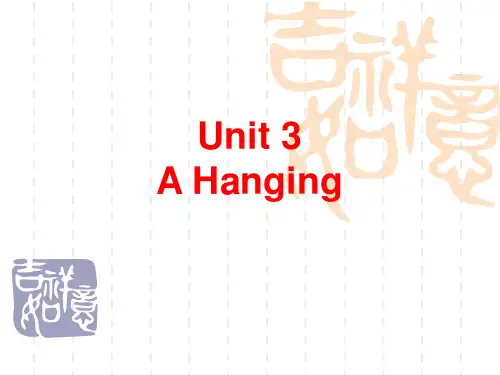
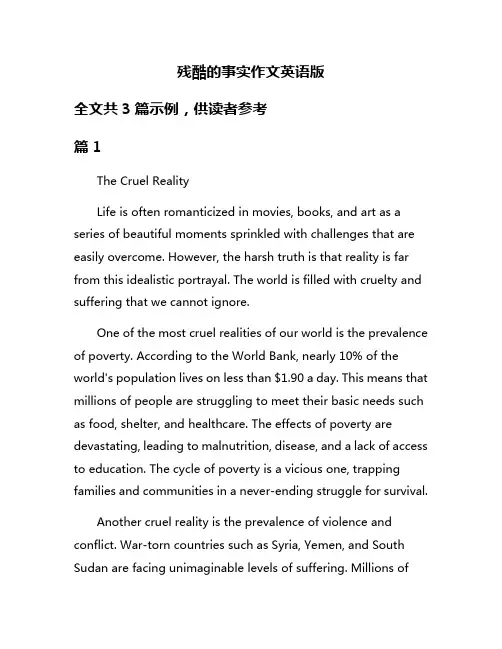
残酷的事实作文英语版全文共3篇示例,供读者参考篇1The Cruel RealityLife is often romanticized in movies, books, and art as a series of beautiful moments sprinkled with challenges that are easily overcome. However, the harsh truth is that reality is far from this idealistic portrayal. The world is filled with cruelty and suffering that we cannot ignore.One of the most cruel realities of our world is the prevalence of poverty. According to the World Bank, nearly 10% of the world's population lives on less than $1.90 a day. This means that millions of people are struggling to meet their basic needs such as food, shelter, and healthcare. The effects of poverty are devastating, leading to malnutrition, disease, and a lack of access to education. The cycle of poverty is a vicious one, trapping families and communities in a never-ending struggle for survival.Another cruel reality is the prevalence of violence and conflict. War-torn countries such as Syria, Yemen, and South Sudan are facing unimaginable levels of suffering. Millions ofpeople have been displaced from their homes, families have been torn apart, and children have been robbed of their childhoods. The scars of war run deep, affecting generations to come.In addition to poverty and conflict, discrimination and inequality continue to plague our society. Women and marginalized communities face systemic barriers that prevent them from achieving their full potential. Racial discrimination, gender inequality, and LGBTQ+ discrimination are just a few examples of the injustices that exist in our world.One of the cruelest realities is the destruction of our planet. Climate change is a looming threat that is already causing disastrous effects such as extreme weather events, rising sea levels, and loss of biodiversity. Despite the overwhelming evidence of the impact of human activity on the environment, many continue to prioritize short-term gain over long-term sustainability.It is easy to turn a blind eye to these harsh realities, to shield ourselves from the discomfort of acknowledging the suffering of others. However, it is only through facing these truths that we can begin to make a change. We must strive to create a more justand equitable world, where all individuals have the opportunity to thrive.As individuals, we can make a difference by supporting organizations that are working to combat poverty, advocating for peace and conflict resolution, challenging discrimination and inequality, and taking action to protect our planet. By coming together as a global community, we can make a positive impact and work towards a more compassionate and just society.The cruel realities of our world are stark and undeniable. However, it is in acknowledging and confronting these truths that we can spark change and create a better future for all. Let us not be daunted by the challenges that lie ahead, but rather inspired to work towards a world where cruelty and suffering are a thing of the past.篇2The Cruel RealityIn this world, there exists a cruel reality that we often try to avoid or ignore. It is a reality filled with suffering, injustice, and heartbreak. From the atrocities of war to the inequalities of poverty, the cruelness of the world is something that cannot be denied.One of the most heartbreaking aspects of this cruel reality is the presence of war and conflict. Every day, people in different parts of the world are living in fear of violence and destruction. Innocent civilians, including women and children, are often the ones who suffer the most in these situations. The images of bombed-out buildings and refugees fleeing their homes are constant reminders of the cruelty of war.In addition to war, poverty is another harsh reality that many people face. While some live in luxury and abundance, others struggle to survive on a daily basis. The gap between the rich and the poor continues to widen, leading to widespread suffering and deprivation for those on the lower end of the spectrum. Hunger, disease, and lack of education are just some of the consequences of poverty that millions of people around the world have to endure.Furthermore, discrimination and prejudice are also part of the cruel reality that many individuals have to deal with. Whether it is based on race, gender, religion, or sexual orientation, discrimination can have a profound impact on a person's life. It can limit their opportunities, harm their mental and emotional well-being, and prevent them from living a fulfilling and happy life.The cruel reality of the world is not something that can be easily fixed or ignored. It requires a collective effort from individuals, communities, and governments to address the root causes of suffering and injustice. This may involve promoting peace and conflict resolution, advocating for social and economic equality, and fostering a culture of acceptance and inclusivity.Although the cruel reality of the world may seem overwhelming at times, it is important to remember that there is still hope. Through acts of kindness, compassion, and solidarity, we can make a positive impact on the lives of others and work towards creating a more just and humane world. While we may not be able to change the world overnight, each small step we take can help to alleviate the suffering of those who are most vulnerable and marginalized.In conclusion, the cruel reality of the world is a harsh reminder of the injustices and hardships that many people face on a daily basis. It is up to all of us to confront this reality with courage, compassion, and determination, and strive to create a more just and equitable society for all. Let us not turn a blind eye to the suffering of others, but instead, work towards a future where everyone can live in peace and dignity.篇3The Cruel RealityThe world we live in is filled with both beauty and darkness, with moments of joy and instances of cruelty. It is a reality that many of us try to ignore or escape from, but ultimately, we must confront the harsh truths that exist around us.One of the cruelest realities of our world is the presence of poverty. Despite living in a time of unprecedented wealth and technological advancements, millions of people around the globe still struggle to meet their basic needs. Children go hungry, families live in squalor, and individuals are denied access to education and healthcare simply because of their economic status. The disparity between the haves and the have-nots is not only unjust, but it is a stain on the collective conscience of humanity.Another brutal truth is the prevalence of violence and conflict. Wars rage on in various parts of the world, tearing apart communities and leaving behind a trail of destruction. Innocent civilians are often caught in the crossfire, becoming victims of senseless brutality. The consequences of war are far-reaching,with generations suffering from trauma and loss long after the fighting has ceased.Furthermore, the exploitation and mistreatment of animals is another grim reality that we must confront. From factory farming to illegal poaching, animals are subjected to unspeakable cruelty and suffering for the sake of human consumption and profit. The disregard for the well-being of our fellow creatures is not only morally reprehensible, but it also reflects a deep-rooted selfishness and lack of empathy.On a more personal level, the cruelty that exists within interpersonal relationships cannot be ignored. Abuse, neglect, and manipulation are all too common in homes and workplaces, leaving individuals feeling trapped and powerless. The scars left by emotional and physical harm can last a lifetime, impacting one's sense of self-worth and ability to trust others.Despite these harsh realities, it is important not to lose hope. While we may not be able to eradicate cruelty entirely, we can work towards creating a more compassionate and just world. By advocating for social justice, supporting humanitarian efforts, and promoting kindness and understanding, we can make a difference in the lives of those who are suffering.It is only by acknowledging the cruel realities that exist in our world that we can begin to address them and strive towards a more equitable and compassionate society. Let us not turn a blind eye to the suffering of others, but instead actively work towards a future where cruelty is the exception rather than the norm.。
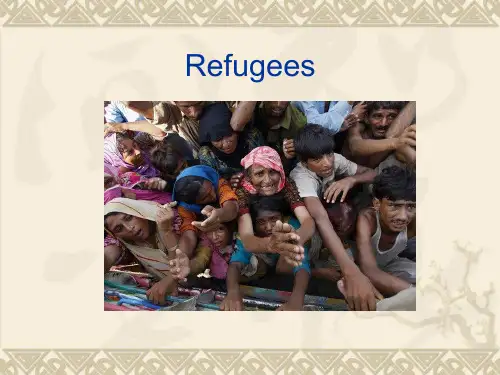
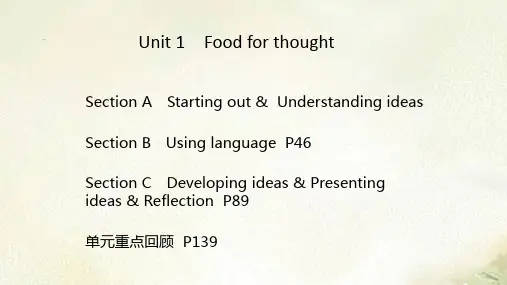
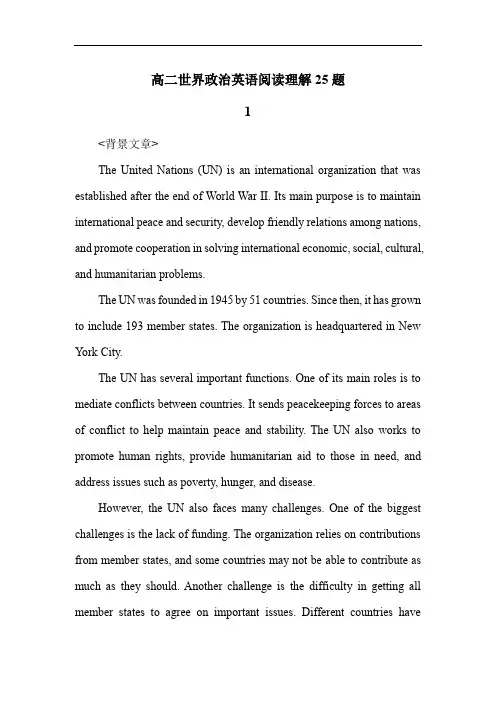
高二世界政治英语阅读理解25题1<背景文章>The United Nations (UN) is an international organization that was established after the end of World War II. Its main purpose is to maintain international peace and security, develop friendly relations among nations, and promote cooperation in solving international economic, social, cultural, and humanitarian problems.The UN was founded in 1945 by 51 countries. Since then, it has grown to include 193 member states. The organization is headquartered in New York City.The UN has several important functions. One of its main roles is to mediate conflicts between countries. It sends peacekeeping forces to areas of conflict to help maintain peace and stability. The UN also works to promote human rights, provide humanitarian aid to those in need, and address issues such as poverty, hunger, and disease.However, the UN also faces many challenges. One of the biggest challenges is the lack of funding. The organization relies on contributions from member states, and some countries may not be able to contribute as much as they should. Another challenge is the difficulty in getting all member states to agree on important issues. Different countries havedifferent interests and priorities, which can make it difficult to reach a consensus.Despite these challenges, the UN remains an important organization in the international community. It continues to work towards its goals of promoting peace, cooperation, and development around the world.1. What is the main purpose of the United Nations?A. To promote economic growth.B. To maintain international peace and security.C. To encourage cultural exchanges.D. To support scientific research.答案:B。
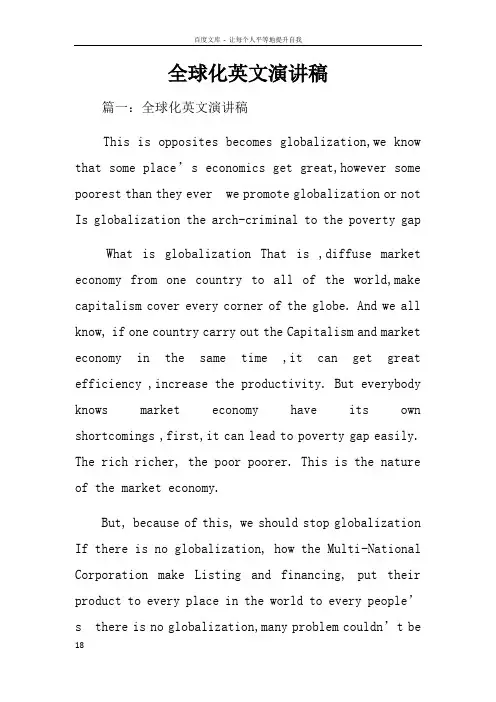
全球化英文演讲稿篇一:全球化英文演讲稿This is opposites becomes globalization,we know that some place’s economics get great,however some poorest than they ever we promote globalization or not Is globalization the arch-criminal to the poverty gap What is globalization That is ,diffuse market economy from one country to all of the world,make capitalism cover every corner of the globe. And we all know, if one country carry out the Capitalism and market economy in the same time ,it can get great efficiency ,increase the productivity. But everybody knows market economy have its own shortcomings ,first,it can lead to poverty gap easily. The rich richer, the poor poorer. This is the nature of the market economy.But, because of this, we should stop globalization If there is no globalization, how the Multi-National Corporation make Listing and financing, put their product to every place in the world to every people’s there is no globalization,many problem couldn’t besolved by peace ways. Like country in Africa get independent.;the chemical weapon in Syria. If there is no globalization ,people with different color skin couldn’t understand each other .our Chinese civilization could not get famous.Just like an old going says,one coins has two sides. Globalization is an inevitable trend, and do good to humas’s Fusion and development. We shouldn’t we should do some things to solve the poverty gap . We can make different tax rate to different people according to income; The richer the more. Open more market, reduce the cost of living;Strengthen the social welfare.Just like Politician Marchinde says: society becomes greater after it gets damaged.篇二:文化全球化英语演讲稿Cultural globalization, which is a direct consequence of economic globalization, rids China of its closed cultural system and leads it into a multicultural society. Chinese culture is the main body of the Confucian culture as a kind of ethnic culture. However, with information and economic integration,cultural exchange warms up quickly. Meanwhile, all kinds of foreign cultures are flocking into China. Standing on the street, you can see McDonald’s and KFC everywhere. Even their passenger volumes are larger than those breakfast stores in China. Most people admit that they would rather eat KFC and don’t want to eat China classic breakfast. Maybe because it’s something new. In the same way, Japanese anime, American movies and South Korean dramas spread to Chinese university campuses, causing a sensation. Chinese students are crazy about those fresh cultures. Some even are proud of knowing better than others. As a result, domestic animation and the Chinese classic get into risks.In this multicultural society, masses of rich and colorful ethnic cultures get together in a melting pot. These foreign cultures shock Chinese culture constantly at their different ideas and customs. In the case, how to deal with the impact of globalization and how to protect and develop Chinese traditional culture, these are hot topics which cause the high attention of policy and public opinion. Should we promote cultural integration or insist of cultural diversityIn a period that the world is increasingly becoming one, it’s advisable for us to take an open attitude to foreign cultures. Only after we do in this way, can we catch a necessary condition for local culture of its survival and development.As we all know, Chinese traditional culture is the spiritual and material wealth the Chinese nation ancestors created. Passing down from generation to generation, it is a distinct national characteristic of the long history of the culture. We must take in mind that our culture is the Chinese nation several thousand years civilization of crystallization. It is our superior culture, which is the other national culture can not replace. According to this, there is no possibility that we agree with cultural integration. Once ethnic cultures come into integration, our national culture will lose its unique characteristics and the ethnic superiority will also disappear. What’s more, the cultural integration makes the world culture big garden become single and boring. Therefore, Chinese culture way for the future development is bound to emphasize and inherit the national cultural essence.But this does not mean that other ethnic cultures mean nothing to us. We should make it clear that foreign cultures have essence and dregs. We should treat them quite sensibly and not extremely. To take the essence and discard the dregs, we will absorb the mankind advanced civilization achievements from foreign cultures.All in all, opinionly, I have the idea that Chinese authorities should encourage cultural diversity. By introducing other excellent ethnic cultures, our traditional culture can be riched and developed well.篇三:21世纪英语演讲稿目录第三届“21世纪杯”全国英语演讲比赛冠军——梁励敏 (2)第三届“21世纪杯”全国英语演讲比赛亚军——芮成钢 (5)第四届“21世纪杯”全国英语演讲比赛冠军——蔡力 ................................................ ... 9第六届“21世纪杯”全国英语演讲比赛冠军——戚悦 ................................................ ..11 第七届“21世纪杯”全国英语演讲比赛冠军——孙宁 .................................................13 第八届“21世纪杯”全国英语演讲比赛冠军——顾秋蓓..............................................17 第九届“21世纪杯”全国英语演讲比赛冠军——洪晔 .................................................20 第十届“21世纪杯”全国英语演讲比赛冠军——夏鹏 .................................................22第一章寻访记忆引子美丽的女主播,刘欣思维的游戏梁励敏演讲就要言之有物芮成钢is there a short cut?孙宁be yourself 顾秋蓓无一不可入演讲洪晔平谈中透着哀伤夏鹏第二章昨日重现(原声)第一届央视《环球了望》选段刘欣第二届穿洋越海梁励敏第三届东西方相聚芮成钢第四届我们和黄河一道成长蔡力第六届新北京,三色新奥运戚悦第七届全球化:中国年轻一代所面临的挑战与机遇孙宁第八届难忘的一幕顾秋蓓第九届机会之门就在前方洪晔第十届城墙与桥梁夏鹏第三章明灯导航“21世纪杯”英语演讲的艺术史蒂芬·卢卡斯第三只眼看演讲吴杏莲附录“21世纪杯”全国英语演讲比赛和流程简介历届比赛一览第三届“21世纪杯”全国英语演讲比赛冠军——梁励敏梁励敏北京外国语大学梁励敏,生于浙江杭州,毕业于北京外国语大学,获英语语言文学硕士学位,研究生期间专攻方向为美国社会研究。
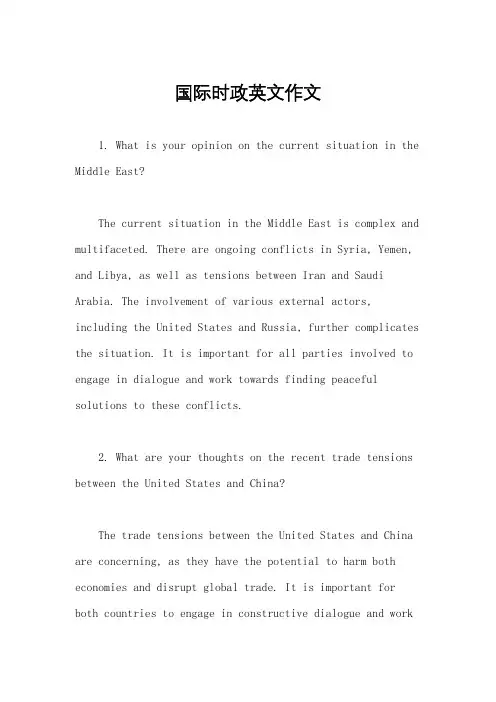
国际时政英文作文1. What is your opinion on the current situation in the Middle East?The current situation in the Middle East is complex and multifaceted. There are ongoing conflicts in Syria, Yemen, and Libya, as well as tensions between Iran and Saudi Arabia. The involvement of various external actors, including the United States and Russia, further complicates the situation. It is important for all parties involved to engage in dialogue and work towards finding peaceful solutions to these conflicts.2. What are your thoughts on the recent trade tensions between the United States and China?The trade tensions between the United States and China are concerning, as they have the potential to harm both economies and disrupt global trade. It is important for both countries to engage in constructive dialogue and worktowards a mutually beneficial solution. Protectionist measures and tariffs are not the answer and will only lead to further tensions.3. What is your perspective on the refugee crisis in Europe?The refugee crisis in Europe is a humanitarian issue that requires a coordinated and compassionate response. It is important for countries to work together to provide support and assistance to those who have been displaced by conflict and persecution. At the same time, efforts must be made to address the root causes of the crisis and promote peace and stability in affected regions.4. What is your opinion on the ongoing protests in Hong Kong?The ongoing protests in Hong Kong are a reflection of the deep-seated concerns and frustrations of the people of Hong Kong. It is important for the government to listen to the voices of its citizens and address their grievances ina peaceful and constructive manner. Violence and repression are not the answer and will only exacerbate the situation. It is also important for the international community to support the people of Hong Kong in their struggle for democracy and human rights. 。
Farewell, Thatcher撒切尔走过世界舞台,以铁腕引领风骚。
词数 498 建议阅读时间 7分钟WORLD politics has been robbed of one of its most powerful voices – Margaret Thatcher.υAfter suffering a stroke (中风), Britain’s former prime minister died on April 8 at the age of 87. As Britain’s first and only female prime minister, Thatcher governed the country from 1979 to 1990. She was famous for her tough style and thus was called the “Iron Lady” worldwide.Her “Iron” personality began to develop when she was little. When World War II broke out, her hometown was one of the early targets of Nazi bombs (轰炸). Her belief in the need to stand up to aggressors (侵略者) was rooted in the failure of then-prime minister Neville Chamberlain’s attempts to appease (安抚) Adolf Hitler rather than confront (对抗) him.“She simply would not allow Britain to be pushed around,” Bernard Ingham, press secretary to Thatcher, told AP.That is why when the territory (领土) dispute over the Malvinas Islands (known as Falklands Islands in the UK) in the South Atlantic Ocean broke out in 1982, she did not hesitate to declare war against Argentina despite her senior military advisers’ opposition. Britain won the war 74 days later.“When you are at war, you have to set out with an iron will to overcome them [difficulties],” she said in her memoir (回忆录), Downing Street Years.She would never change her mind once she thought she was doing something good for Britain. Motivated by an unshakable belief that free markets would build a better country, Thatcher sold off one state industry after another – British Telecom, British Gas, British Airways, British Coal and British Steel.She once told members of her party who were urging her to moderate (和缓) her policies: “The lady’s not for turning.”For admirers, Thatcher rescued Britain from the destruction wrought (制造) by her predecessors (前任) and laid the groundwork for an extraordinary economic renaissance. For critics, AP commented, she was “a heartless tyrant (暴君) who ushered in (开创) an era of greed (贪婪) that kicked the weak out onto the streets and let the rich become filthy (肮脏的) rich, and also set the stage for the financial crisis that Britain is now dealing with”.But according to British Prime Minister David Cameron, Thatcher is the symbol of patriotism (爱国主义).“If there is one thing that cuts through all of this, one thing that runs through everything that she did, it was her lionhearted love of this country,” Cameron said.ϖThatcher played a key role in China’s relationship with the UK, especially in the peaceful handover of Hong Kong, said China Daily.She visited China four times. During her second visit in 1982, the first visit to China by a serving British prime minister, she met Chinese leader Deng Xiaoping and discussed the future of Hong Kong.“She called for dialogue instead of confrontation with China in resolving (解决) the Hong Kong question,” Tian Dewen, an expert on European studies at the Chinese Academy of SocialSciences, told China Daily.After two years of negotiations (谈判), China and Britain released the Sino-British Joint Declaration in 1984, paving the way for Hong Kong’s handover in 1997.中国人应该弃用筷子,改成刀叉?Fan Mengqi: I shall never say farewell (再见) to chopsticks, which have led me to so many Chinese culinary (烹饪的) delights. Chopsticks are not only a tool for eating but also a symbol of traditional Chinese culture. We should cherish (珍惜) our culture.Chen Zihan: It’s true that wooden chopsticks, including disposable (一次性的) ones, cause many environmental problems. But wooden or disposable knives and forks can cause the same problems! So what we should consider is not whether we should give up chopsticks or not, but how to make chopsticks more environmentally friendly.Huang Yupan: It’s unlikely that chopsticks, which are commonly used in Asian countries, especially in China, can be replaced by knives and forks. Chopsticks are a product of Chinese civilization, containing a lot of wisdom. And research has shown that using chopsticks benefits people’s hand-eye coordination (协调性), which can improve people’s intelligence.Guo Keyu: Disposable chopsticks do real harm to forests. But it’s unnecessary for us to turn to knives and forks. We can bring our own chopsticks whenever we eat out and forbid using disposable chopsticks.Chen Xingzhu: I agree that we cannot totally get rid of chopsticks, but how about using knives and forks more often? It adds fun to our lives and more importantly may be good for our health. We only use one hand to hold chopsticks. But to use knives and forks, we need two hands. It can help make both our left and right brain hemispheres (半球) work better.Zhang Wuqing:Chopsticks stand for traditional Chinese culture while knives and forks stand for Western culture. I think every Chinese should be allowed to make a choice based on his or her own preference. But we should always remember our traditional Chinese culture. Students in Syria.叙利亚战火下的中学生。
高三英语作文文化遗产保护Cultural heritage is an embodiment of the history, identity, and values of communities around the world. It encompasses tangible elements such as monuments, buildings, and artworks, as well as intangible aspects like traditions, rituals, and languages. As globalization progresses and modernity often overshadows the past, the importance of preserving cultural heritage has never been more crucial. This essay discusses the significance of cultural heritage preservation, the challenges it faces, and the various ways in which individuals and society can contribute to safeguarding this invaluable asset for future generations.To begin with, cultural heritage plays a vital role in shaping our identity. It bridges the past and the present, allowing individuals and communities to understand their roots and foster a sense of belonging. For example, landmarkslike the Great Wall of China or the Pyramids of Giza are not only architectural marvels but also symbols of national pride and identity. When we engage with our cultural heritage, we gain a deeper appreciation of our history and the struggles and triumphs of those who came before us. This connection to our heritage fosters social cohesion and strengthens community bonds, as people unite to celebrate and protect their shared history.Furthermore, cultural heritage is a significant driver of tourism and economic growth. Countries rich in cultural heritage attract millions of visitors each year, generating revenue and creating jobs in sectors such as hospitality, arts, and crafts. For instance, cities like Rome and Athens rely heavily on their archaeological sites and historical monuments to draw tourists from all over the globe. This influx of visitors not only boosts local economies but also provides an opportunity for cultural exchange, fostering mutual understanding among diverse peoples. Thus,safeguarding cultural heritage contributes not only to the identity of a community but also to its economic sustainability.Despite its importance, cultural heritage is under threat from various factors. Urbanization, climate change, and conflict are some of the leading causes of deterioration and destruction of cultural sites. Rapid urban development often leads to the demolition of historic neighborhoods to make way for modern infrastructure. For instance, the ongoing construction projects in many cities have resulted in the loss of traditional architecture, displacing communities and erasing their cultural narratives. Additionally, climate change poses a significant risk as rising sea levels and extreme weather events can damage or destroy cultural sites that have stood for centuries. Lastly, armed conflicts have led to the deliberate destruction of cultural heritage, such as the targeting of ancient sites in Syria and Iraq byextremist groups. These challenges highlight the urgent need for proactive measures to protect our cultural heritage.There are several strategies that can be employed to promote cultural heritage preservation. First and foremost, raising awareness about the significance of cultural heritage is essential. Educational programs in schools can teach young people about their history and the importance of preserving their cultural identity. Community engagement through workshops, presentations, and cultural festivals can also encourage active participation in protecting cultural heritage. By fostering a sense of ownership andresponsibility towards cultural heritage, individuals are more likely to contribute to its preservation.Moreover, governments and international organizations play a crucial role in safeguarding cultural heritage. Policies and legislation need to be enacted that protect historical sites and regulate urban development. For example,UNESCO (United Nations Educational, Scientific and Cultural Organization) plays an instrumental role in identifying and maintaining World Heritage Sites. These initiatives provide a framework for countries to collaborate in preserving sites of global significance. Additionally, financial support from governments and international bodies is vital for restoration projects and conservation efforts. By allocating funds to maintain and restore cultural sites, we can ensure thatfuture generations have the opportunity to connect with their heritage.In addition to governmental efforts, local communities must also take the initiative to preserve their cultural heritage. Community-led initiatives, such as creatingcultural heritage societies or organizing volunteer conservation groups, can empower individuals to take action. For example, local artisans can promote traditional crafts, ensuring that skills and techniques are passed down through generations. Furthermore, fostering partnerships betweenlocal communities and tourism operators can create sustainable tourism that benefits both the economy and the preservation of cultural heritage. By prioritizing cultural heritage in tourism development, destinations can enhance visitor experiences while safeguarding their unique identity.Technological advancements have also become a valuable tool in the preservation of cultural heritage. Digital archiving, 3D modeling, and virtual reality can provide innovative ways to document and display cultural sites and artifacts. For instance, digitization projects enable the preservation of historical texts and manuscripts, making them accessible to a broader audience. Additionally, virtual reality experiences can transport individuals to culturally significant locations, fostering appreciation and understanding without the need for physical access. By embracing technology, we can create new avenues for cultural heritage engagement and preservation.In conclusion, the preservation of cultural heritage is of paramount importance in today's rapidly changing world. It strengthens our identity, drives economic growth, and fosters social cohesion among communities. However, the challenges facing cultural heritage are significant and require concerted efforts from individuals, governments, and organizations. By raising awareness, enacting protective policies, engaging local communities, and leveraging technology, we can ensure that our cultural heritage is protected and cherished for future generations. Ultimately, the preservation of cultural heritage is not just about safeguarding the past; it is about enriching our present and inspiring future generations to appreciate and celebrate the diversity of human experience.。
人教版高二英语听力新闻听力练习题30题含答案解析1. You are going to hear a news report about the G20 Summit. What is the main topic discussed in this summit?A. Climate changeB. Trade policiesC. Global securityD. Space exploration答案:A。
解析:在听力原文中明确提到此次G20峰会的主要话题是气候变化,其他选项如贸易政策、全球安全和太空探索均未被提及是本次峰会的主要话题。
2. Listen to a news piece on the European economy. Which country in Europe has the highest GDP growth rate this year?A. GermanyB. FranceC. ItalyD. Spain答案:D。
解析:根据听力内容,给出了欧洲各国GDP增长率的数据,其中西班牙的GDP增长率在这几个国家中是最高的,而德国、法国和意大利的增长率低于西班牙。
3. A news report is about a new cultural festival in Asia. Where is thisfestival held?A. Tokyo, JapanB. Seoul, South KoreaC. Bangkok, ThailandD. Kuala Lumpur, Malaysia答案:C。
解析:从听力原文中可知,这个新文化节的举办地点是泰国的曼谷,东京、首尔和吉隆坡都不是此次文化节的举办地。
4. In a news about international trade, which product has seen the biggest increase in export from China?A. ElectronicsB. TextilesC. ToysD. Agricultural products答案:A。
what is the attitude of china facing of the Syria war? why?
China disapprove the policy of taking military action on Syria and support the plan that if
Syria hand over the chemical weapons ,it will not confront the war declared by America.
Reasons
1 china’s foreign policy “Safeguarding world peace, promoting economic
development” “Stand on one's own foreign policy of peace”
2 china will not do anything that destroy the world peace harmful to other country.
3 China is a country of loving peace and chinese always kind to others.
4 China has long been a champion of Justice.
5 Western countries have other reasons to do so ,china does not like that.